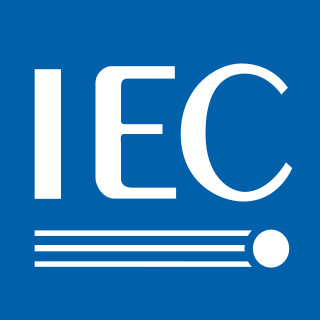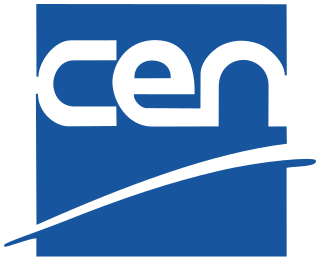
The International Electrotechnical Commission is an international standards organization that prepares and publishes international standards for all electrical, electronic and related technologies – collectively known as "electrotechnology". IEC standards cover a vast range of technologies from power generation, transmission and distribution to home appliances and office equipment, semiconductors, fibre optics, batteries, solar energy, nanotechnology and marine energy as well as many others. The IEC also manages four global conformity assessment systems that certify whether equipment, system or components conform to its international standards.
An international standard is a technical standard developed by one or more international standards organizations. International standards are available for consideration and use worldwide. The most prominent such organization is the International Organization for Standardization (ISO). Other prominent international standards organizations including the International Telecommunication Union (ITU) and the International Electrotechnical Commission (IEC). Together, these three organizations have formed the World Standards Cooperation alliance.

CENELEC is responsible for European standardization in the area of electrical engineering. Together with ETSI (telecommunications) and CEN, it forms the European system for technical standardization. Standards harmonised by these agencies are regularly adopted in many countries outside Europe which follow European technical standards. Although CENELEC works closely with the European Union, it is not an EU institution. Nevertheless, its standards are "EN" EU standards, thanks to EU Regulation 1025/2012.
A standards organization, standards body, standards developing organization (SDO), or standards setting organization (SSO) is an organization whose primary function is developing, coordinating, promulgating, revising, amending, reissuing, interpreting, or otherwise contributing to the usefulness of technical standards to those who employ them. Such an organization works to create uniformity across producers, consumers, government agencies, and other relevant parties regarding terminology, product specifications, protocols, and more. Its goals could include ensuring that Company A's external hard drive works on Company B's computer, an individual's blood pressure measures the same with Company C's sphygmomanometer as it does with Company D's, or that all shirts that should not be ironed have the same icon on the label.

The European Committee for Standardization is a public standards organization whose mission is to foster the economy of the European Single Market and the wider European continent in global trading, the welfare of European citizens and the environment by providing an efficient infrastructure to interested parties for the development, maintenance and distribution of coherent sets of standards and specifications.

ANEC, formally The European consumer voice in standardisation, is an organisation promoting and defending the collective European consumer interest in the process of standardization, and in related fields such as conformity assessment (e.g.certification), market surveillance and enforcement. ANEC also aims to influence legislation that makes reference to standards or standardization. In November 2008, ANEC adopted the strapline 'Raising Standards for Consumers' as part of an initiative to improve the visibility of the association. On 15 March 2018, World Consumer Rights' Day, ANEC launched a short video to explain its role and highlight some of its successes.
European Standards, sometimes called Euronorm, are technical standards which have been ratified by one of the three European Standards Organizations (ESO): European Committee for Standardization (CEN), European Committee for Electrotechnical Standardization (CENELEC), or European Telecommunications Standards Institute (ETSI). All ENs are designed and created by all standards organizations and interested parties through a transparent, open, and consensual process.
The German Commission for Electrotechnical, Electronic & Information Technologies of DIN and VDE, abbreviated DKE, is the German organisation responsible for the development and adoption of standards and safety specifications in the areas of electrical engineering, electronics and information technologies.
The Spanish Association for Standardization and Certification is an entity dedicated to the development of Standardization and Certification in all Spanish industrial and service sectors.

The British Standards Institution (BSI) is the national standards body of the United Kingdom. BSI produces technical standards on a wide range of products and services and also supplies certification and standards-related services to businesses.

The European Cooperation for Space Standardization (ECSS) is a collaboration between the European Space Agency (ESA), the European space industry represented by Eurospace, and several space agencies, to develop and maintain a coherent, single set of user-friendly standards for use in all European space activities. Established in 1993 following a call by Eurospace to unify space products assurance standardization on a European level, it was officially adopted by the ESA on 23 June 1994 through the resolution ESA/C/CXIII/Res.1, to replace its own Procedures, Specifications and Standards (PSS) system. The ECSS currently has 139 active standards, forming the ECSS system. These standards cover management, engineering, product assurance, and space sustainability disciplines. The ECSS is managed by the ESA Requirement and Standard Division, based in the European Space Research and Technology Centre (ESTEC) in Noordwijk, the Netherlands. The ECSS maintains connections with multiple European and international standardization organizations, to contribute to standardization and to adopt relevant standards as part of the ECSS system.
Transport standards organisations is an article transport Standards organisations, consortia and groups that are involved in producing and maintaining standards that are relevant to the global transport technology, transport journey planning and transport ticket/retailing industry. Transport systems are inherently distributed systems with complex information requirements. Robust modern standards for transport data are important for the safe and efficient operation of transport systems. These include:

The Keymark is a voluntary European certification mark demonstrating compliance with the European Standard (EN). It is owned by CEN, the European Committee for Standardization, and CENELEC, the European Committee for Electrotechnical Standardization.
CEN/CENELEC Guide 6: Guidelines for standards developers to address the needs of older persons and persons with disabilities is a document for participants in standardisation activities at CEN and CENELEC that contains guidance for the creation and the revision of standards to ensure greater accessibility of products and services. The document is a "Guide", in other words, not a European Standard (EN). The guide is identical to ISO/IEC Guide 71 and was adopted by both the CEN Technical Board and the CENELEC Technical Board, and published in January 2002. The adoption of CEN/CENELEC Guide 6 resulted from a European mandate to the European standardisation organisations, and the European Commission is funding projects to promote the use of the Guide.

The common external power supply was a European Commission (EC) specification for a universal charger for smartphones sold within the European Union. The specification included the use of a USB Micro-B connector and adherence to the USB Battery Charging Specification.
ISO/IEC JTC 1/SC 39 Sustainability for and by Information Technology is a standardization subcommittee of the Joint Technical Committee ISO/IEC JTC 1 of the International Organization for Standardization (ISO) and the International Electrotechnical Commission (IEC), that develops and facilitates standards within the field of sustainability and resource efficiency through Information Technology. The international secretariat of ISO/IEC JTC 1/SC 39 is the American National Standards Institute (ANSI), located in the United States.
ISO/IEC JTC 1/SC 25 Interconnection of information technology equipment is a standardization subcommittee of the Joint Technical Committee ISO/IEC JTC 1, of the International Organization for Standardization (ISO) and the International Electrotechnical Commission (IEC), which develops and facilitates standards within the field of interconnection of information technology equipment. The international secretariat of ISO/IEC JTC 1/SC 25 is the Deutsches Institut für Normung (DIN) located in Germany.

Ian Bryant is a British academic, engaged in promoting Trustworthy Software and Systems, and in Standardisation.
ISO/IEC JTC 1/SC 31 Automatic identification and data capture techniques is a subcommittee of the International Organization for Standardization (ISO) and the International Electrotechnical Commission (IEC) Joint Technical Committee (JTC) 1, and was established in 1996. SC 31 develops and facilitates international standards, technical reports, and technical specifications in the field of automatic identification and data capture techniques. The first Plenary established three working groups (WGs): Data Carriers, Data Content, and Conformance. Subsequent Plenaries established other working groups: RFID, RTLS, Mobile Item Identification and Management, Security and File Management, and Applications.
Harmonization is the process of minimizing redundant or conflicting standards which may have evolved independently. The name is also an analogy to the process to harmonizing discordant music.











